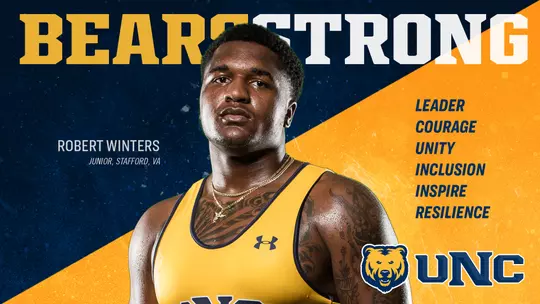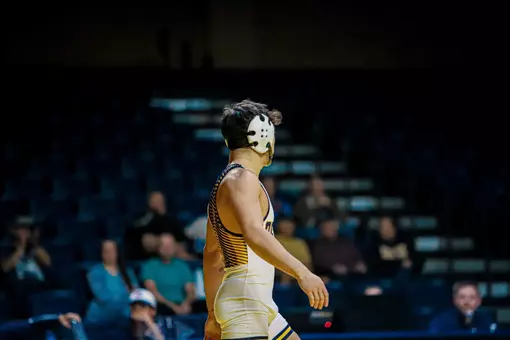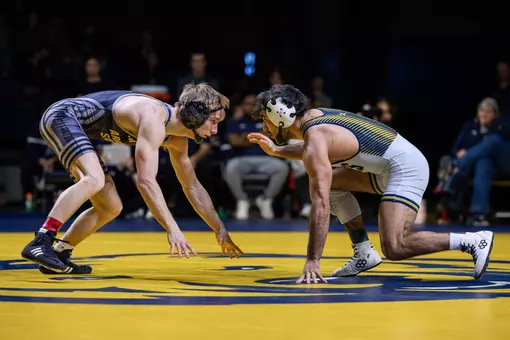
Become Comfortable with the Uncomfortable
Ryan Pfeifer, UNCBears.com
9/2/2020
Become comfortable with the uncomfortable, that’s the challenge to the world we live in. For wrestler Robert Winters, it’s something he’s ready to see become the norm.
The redshirt senior was born in Mississippi and grew up in Virginia before coming to Colorado for college. As a young black man, he was taught how to keep himself safe and had moments that should be celebrated, become subdued because of another lesson a black person has to learn that others do not.
“I was taught when I was young was to not draw attention to myself,” Winters said. “One of the saddest things I think was when I got my licenses. That’s when a kid should have a sense of freedom and that they can take on the world, but my parents had to sit me down and talk to me about what to do if I was to get pulled over.”
Winter’s lesson from his parents is normal for the life of young black people around the nation. Tips, lessons and concerns from parents for their kids to survive today and see tomorrow. He received more as he moved to Colorado for his college years and also experience culture shock when he first arrived at UNC.

“Moving to Colorado was a culture shock. Where I grew up there were people of all races and it was extremely diverse. Coming here it was weird there were not a lot of people like me. That has changed, UNC has become extremely diverse in the five years I have been here.”
Culture shock did not just impact Winters, but also one of his teammates. For the teammate Winters was the first black person he became friends with. That opened the door to start the process of becoming comfortable with the uncomfortable.
“I had a teammate that I was the first black friend he had. I asked him about what characteristics a black person has, is it like what you see in the movies? He said that is what he thought. I felt sad that’s the view people have because they do not know a black person.”
“The number one stereotype that needs to be nipped in the bud now is that black skin is threatening. That infuriates me why are people afraid? You do not know me you’ve never met me.”
Stereotypes build walls and bring about actions without getting to ever know a person for who they truly are. One of the biggest stereotypes surrounding black people, particularly men, is that they are threatening.
“The number one stereotype that needs to be nipped in the bud now is that black skin is threatening. That infuriates me why are people afraid? You do not know me you’ve never met me.”
Because of the stereotype cast upon black people, the simple act of walking to his car is even a challenge for Winters.
“One thing I have noticed is when I’m walking to my car and someone will stare at me from across the street like I was stealing the car. In the past, I have had to use the remote start for my car to show it is mine as I walk to it. I should not have to do that. I should not have to feel like I am going to be hurt walking to my car.”
Instead, there are ways to get past stereotypes, through talking about the stereotypes either one-on-one or in a group setting, educating yourself and pushing yourself outside your comfort zone. That’s something Winters and many others are trying to do.
“Racism and racial injustice have to stay a continuous conversation. Look back at the civil rights movements. People thought racism was done back then, but it just changes form. Lynching’s and acts like that were over but it continues to evolve. For people who want to be eased into the uncomfortable conversations, there are plenty of resources in books, movies and shows. The movie 13th is fantastic, everything in that is real and shows numbers and facts and figures. People are so closed-minded and do not want to do anything unless it directly affects them. That right there is the problem.”
Winters plans to keep that conversation going both with his teammates and throughout the athletic department.
“As a member of the UNC Bears Against Racial Strife (B.A.R.S.) group, we are working to educate and reach out to campus. As far as team-wise we have vocal leaders on the team. It is hard to talk to people about these topics through group texts. Face to face and in a group setting in person will help with having these uncomfortable conversations.”





